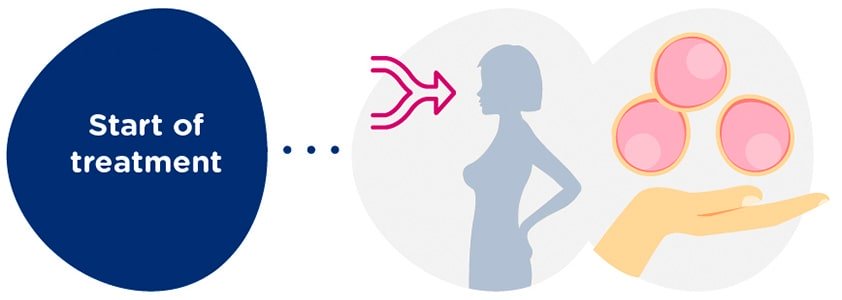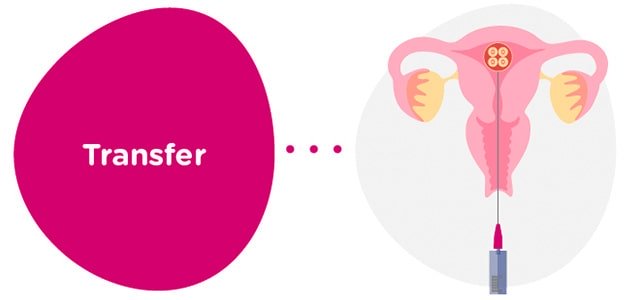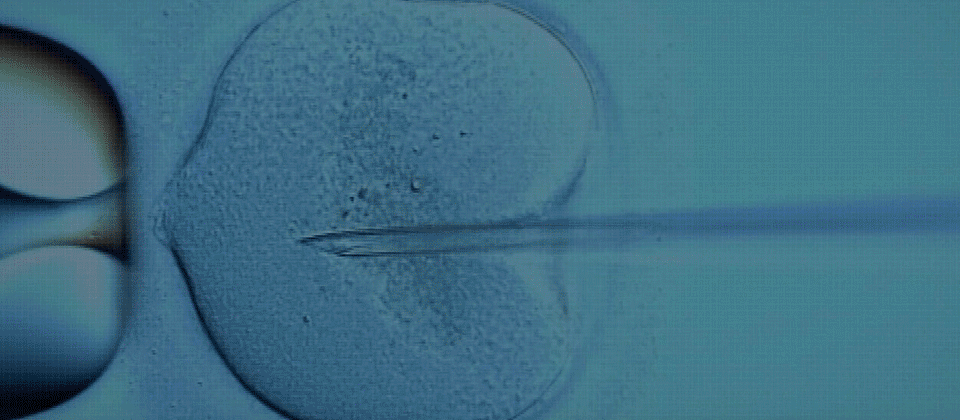Egg donation Spain

What are the steps of the process?
Egg donation consists of three main steps:



In Vitro fertilisation + embryo culture

How is the treatment performed?
Find out everything you need to know.
General information
Egg donation is recommended in cases where the woman cannot achieve a pregnancy with her own eggs. The most common causes are:
- Advanced age
- Low egg quality
- Low ovarian reserve after repeated In Vitro fertilisation failures
- Genetic disorders
Performing egg donation requires a series of additional tests:
- Gynaecological ultrasound to rule out uterine and ovarian diseases.
- Semen analysis to evaluate the quality of the sample. If sperm quality is very low, it will be necessary to extend the andrological examination with other additional tests.
- Male karyotype to rule out genetic abnormalities which may affect the embryo.
- Serologic test to rule out the presence of transmissible infectious diseases.
You can resume normal life throughout the process until the embryo transfer. On this particular day, it is recommended to comparatively rest and, from then on, you should lead a quiet life avoiding significant strain, the same as if you were trying to become pregnant naturally.
There is no problem with travelling after embryo transfer.
There is no limit to the number of egg donations that can be performed but it must be acknowledged that 90% of the patients achieve a pregnancy within 3 egg donation cycles.
Unlike In Vitro fertilisation, there is no need to wait to perform another cycle with egg donation, since the uterus is ready to receive embryos again after the period. It is convenient to re-evaluate the case after each cycle which did not achieve a pregnancy, in order to determine whether more tests are necessary.
Gynaecological tests
You will have to go to the clinic twice to perform the treatment. The first time to organize the cycle and to freeze a sperm sample if necessary. The second time to perform the embryo transfer.
During the process, an endometrial ultrasound scan will be performed that can take places at the Clinic or with your usual gynaecologist.
Donor selection
Egg donors are young women aged between 18 and 35, and in good physical and mental health. They will have to pass a series of tests to become a donor, which include examining their personal and family medical history, a psychological evaluation, general and gynaecological examinations, a blood test to rule out possible infectious diseases and necessary genetic testing.
All our female egg donors must have undergone the strictest selection tests to determine their eligibility as donor.
With the aim of offering the highest quality treatments, Barcelona IVF subjects its donors a carrier genetic test to reduce the risk of some severe hereditary diseases.
Once the donor has been selected, we can evaluate the risk of whether the child will have any of these diseases. To that end, the father needs to undergo the carrier genetic test as well. In the event an increased risk is detected, a different, compatible donor will be sought out in whom the risk is low.
In Spain, egg donation is anonymous which protects the identities of both the donor and the patients and their offspring. Nevertheless, it is possible to learn general information about the donor, such as her physical characteristics, blood group and age.
At Barcelona IVF, we also share details on the donor related to her hobbies, personality and the reason why she decided to donate, so that you have all the information available on the donor, always in compliance with the Law and respecting the privacy of all parties involved.

Synchronisation
In order for egg donation to be performed, the donor and the patient need to start their cycle at the same time, to ensure that the patient’s uterus is prepared when the embryos are transferred.
This stage lasts for approximately 2 to 3 weeks and is very important in order to have the highest chances of success in the treatment.
Endometrial preparation
The endometrium is prepared to receive embryos through alternate hormone therapy that imitates the woman’s natural cycle.
- We start with oestrogen, checking the endometrial development with a vaginal ultrasound.
- Once the eggs are collected from the donor, progesterone will be added to the therapy so that the endometrium is receptive on the day of the embryo transfer and to maximise the chances for pregnancy.
Embryo collection and transfer
Egg donation at Barcelona IVF
At Barcelona IVF, we guarantee you:
- The highest quality in selecting our donors: we apply the strictest selection tests to ensure the greatest safety in this process.
- Best results: at Barcelona IVF, we guarantee that the recipient will receive at least 8 mature eggs from the donor. Along with the embryo blastocyst culture, this allows us to achieve the best results.
- Genetics Matching with the egg donor: it allows us to reduce the risk that the unborn child will suffer from more than 250 known genetic diseases.

Positive results
The rates for pregnancy with egg donation do not depend on the patient’s age. On this graph you will find the rates for pregnancy after the transfer of fresh and frozen embryos from the same cycle.
Price of egg donation
The price of egg donation fertility treatment is € 6.980 and includes:
- Medical appointments
- At least 8 mature eggs from the donor
- Transfer
- Ultrasound scans during the cycle
- ICSI
- B-hCG
- Hormone tests during the cycle
- Embryo culture
- Guarantees: Minimum 2 blastocysts
